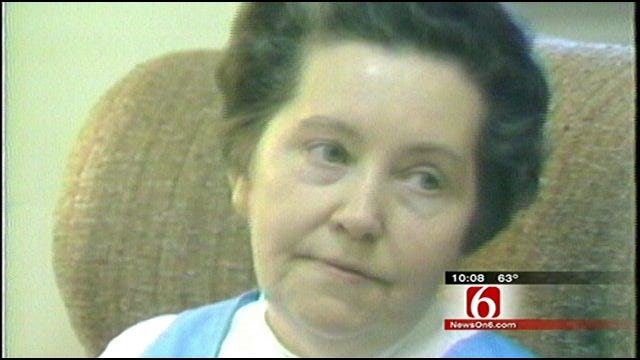Rogers County Woman Who Fought Black Fox Plant Left Lasting Legacy
Rallying around a soft-spoken grandmother, those who fought the Black Fox plant in Rogers County made their point, and American history, at the same time.Thursday, April 28th 2011, 7:24 pm
Scott Thompson, News On 6
ROGERS COUNTY -- It's what those who fought the Black Fox plant in Rogers County all those years ago so feared: that nuclear power was too dangerous. Rallying around a soft-spoken grandmother, they made their point, and American history, at the same time.
Randy Crouch has taken up for causes from a stage. Grounded in the tradition of Oklahoma's Red Dirt music.
"I was already a big fan of Woody Guthrie's and Oklahoma protest music was kind of one thing we always called our music," he said.
Musicians can find lots of things to protest: far-away wars and a myriad of slights and injustices. But 35 years ago, the threat, as Randy and thousands of others saw it, was just down the road and it terrified them.
"The more I got educated about the dangers I just wanted to help," he said.
In the spring of 1973, with great fanfare, Public Service Company announced it was building two nuclear power reactors in southern Rogers County, a stone's throw from Inola.
At a site PSO named Black Fox, the friendly atom would be harnessed to provide unlimited power, bringing unbridled economic growth.
U.S. Senator Henry Bellmon was in the limelight. The Billings, Oklahoma, farmer donned a hard hat and started up the first of 12 giant earth moving machines and took his own brief tour.
It would be cheap and perfectly safe, the power company promised.
Carrie Dickerson was a Claremore teacher and nurse who knew nothing of nuclear power. But when she heard of PSO's plan, she schooled herself and then she went to battle.
"Black Fox is not dead, but we're sure gonna kill it," Dickerson said at the time.
In a fight that lasted nine years and drained her family's savings, cost her family's business, her husband's health and untold fractured friendships, Carrie Dickerson fought PSO in every hearing room, courtroom and commission meeting.
Inspired by the unassuming farmer's wife, thousands of others, like Marilyn McCullooch, joined in street marches and benefit concerts.
"Carrie could kind of see what could happen, and now we all see what could happen, we see what's happened in Japan," McCullooch said.
The Black Fox reactors were to be the same General Electric boiling water models that stand crippled now in Japan, poisoning the soil, water, air and food supply there with astounding levels of radiation.
Back then, PSO promised thousands of construction jobs and that with an influx of new tax money, Inola would be able to build the grandest school in all of Oklahoma.
"Far as I know, all the people in Inola have welcomed it. 'Cause this county right here'll be one of the richest school districts in the state," one man said at the time.
But what good was that, Carrie Dickerson reasoned, if the children in its shiny new classrooms lived with the specter of this?
Black Fox would draw in 44 million gallons of Verdigris River water every day to cool its reactors, and dump the heated wastewater back into the river three miles upstream of the intake pipe of Broken Arrow's water supply.
To this day, there would still be no place to store its huge pile of spent fuel rods. To her, it seemed like madness. For that, a lot of her neighbors hated Carrie Dickerson.
"People who speak an uncomfortable truth to us often find themselves in that position," Louis Bullock said.
Tulsa attorney Lou Bullock was part of the legal team Dickerson's grass-roots group cobbled together.
"The risk, the real risk to human health and our environment posed by that plant warranted it being stopped," he said.
The end came in February 1982.
Kept on the defensive for nine years by Carrie, facing staggering cost overruns that would bankrupt the company and a massive rate-hike that would devastate its customers, PSO pulled the plug on Black Fox, making it the only nuclear plant under construction in American history that was stopped by citizen action
Carrie Dickerson: "I could just sing with joy I'm so happy."
Reporter: "You've been fighting this for a long time, would you do it all over again?"
Carrie Dickerson: "Definitely, I couldn't live with myself if I didn't."
Inspired by the struggle, in 1982 Randy Crouch and his wife Liz moved to a former landfill in Cherokee County where they live off the electric grid in a hand built geodesic dome.
"Talk about a grassroots hero, that was Carrie," McCullooch said.
Marilyn McCullooch stays active in the Carrie Dickerson Foundation. Louis Bullock still sides with underdogs.
"Oh, the work I did on this is one of the things that I'm most proud of," he said.
In Rogers County, a concrete monument to what might-have-been molders there still at the end of a road that disappears into the horizon. A road a Rogers County farmer's wife didn't feel safe traveling. A horizon, she warned four years before her death, we dare not cross.
"A lot of people now don't even know about Black Fox, but the people who were here then come in and say I want to thank you 'cause I can sleep tonight," one woman said.
In the end, all of our energy options come with risk and threat of environmental damage, except conservation, simply using less.
Spokesmen for both PSO and OG&E tell News On 6 nuclear power has a role, but then quickly add they've got no plans to pursue it. PSO says it's too costly and cumbersome and impossible these days to get a new plant licensed or built.
More Like This
April 28th, 2011
January 2nd, 2025
Top Headlines
June 13th, 2025












